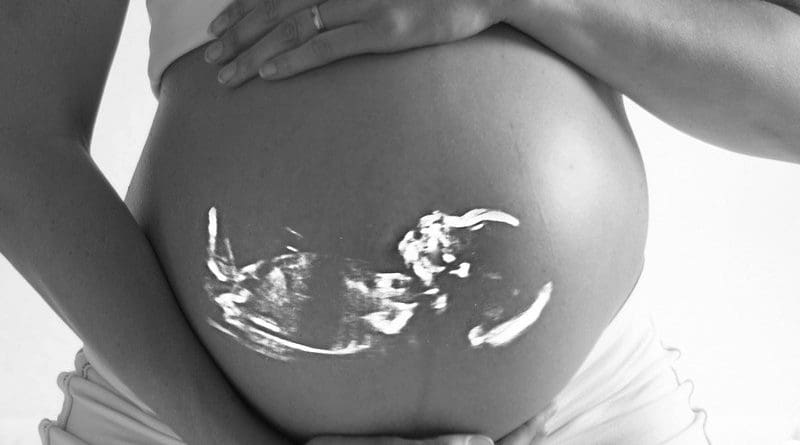The Worst Pro-Choice Argument – OpEd
For many reasons, I strongly oppose state restrictions on abortion. I think women have a right to control their bodies, and the state cannot morally force them to give birth. The implications of allowing the state to mandate a woman to carry a baby to term, even if the baby inside her is regarded as a human being with the right to life, are horrifying. A pregnant woman would have no right to commit suicide, for example. Besides all this, there are many practical problems that would arise in allowing the government to have authority over this matter. I think there is much to learn from the Catholic principle of subsidiarity on this and many other issues. The state is not the proper earthly authority to deal with abortion.
Yet there is an argument for abortion that I find very bothersome, and that is the contention that the unborn baby is not a human being with rights. This often comes up in any discussion of the moral significance of abortion during different stages of pregnancy. Some radical pro-choicers will say any attempt to humanize the fetus, even up until birth, is a claim against the mother’s rights and a threat to the pro-choice project. (Of course, some pro-life absolutists also think that the ethical difference between aborting a one-week zygote and a six-month fetus is non-existent; I disagree.)
We are now seeing the full implications of this extremist pro-abortion view in the arguments being made on behalf of “after-birth abortion.” Some pro-choicers, who argue that abortion must be permitted exactly because the fetus carries no moral significance compared to the interests of the mother, have taken that premise to a logical conclusion, now explicitly arguing that a baby born has no rights that its mother is bound to respect, assuming the inconvenience and burden of caring for the baby are great enough to warrant killing the infant.
I find this argument abhorrent, as do many pro-lifers and some pro-choicers, yet it is a corollary of one particular argument made to defend abortion (and an argument, I would add, that is entirely unnecessary to oppose all state intervention in abortion).
Another whole bundle of questions raised by this troubling pro-infanticide argument concerns the rights of parents and the rights of children, questions rarely brought up in these discussions because they are uncomfortable for most people on both sides of the matter. There is a strain of thought, sometimes held by pro-lifers, ironically enough, that argues that children are the property of their parents. I find this view to be morally degenerate, and to justify infanticide when taken to its logical extreme. Children are human beings and cannot therefore be anyone else’s property. Parents have guardianship rights and duties that arise from their relationship to dependent children, but these emerge from the human nature of the adults and children involved, a human nature that cannot be separated from the rights of those humans. Babies have a right not to be killed, tortured, abused, beaten, and so forth—and children in general are self-owners whose limited capacity to vindicate their own rights temporarily delegates authority to their parents, but does not mean they cannot ultimately vindicate their rights when they have the capacity to assert them. I agree with Murray Rothbard’s basic breakdown that parents have the right to set the rules and children have the right to run away. Certainly a teenager can be bound by a curfew as a condition of living in his parents’ house. Before children are capable of asserting their rights and understanding the rules, things are a little trickier, but they still have basic rights that parents must respect, doing their best to assume what rights the children would want acknowledged if they were old enough to speak up—you can’t throw an infant into fire, despite what Benjamin Tucker said. Brutality against children and surely infanticide would be severe acts of criminality. Infanticide would be murder just as killing an adult would be murder.
Parents who cannot take care of their infants due to extreme financial hardship cannot, in my view, be legally bound to take care of their offspring, beyond finding a safe and reasonable caretaker for their kids. They cannot just abandon infants in the middle of the woods, but must find someone to care for the infant—a positive obligation taken on, at least in most normal circumstances, by virtue of being a parent. So the “pro-choice” option for a parent who cannot care for an infant is adoption or something similar; not killing the baby.
Babies are human beings, even before they are born. They have rights even before they can assert them. The state should butt out of all abortions and the moral issues should be handled by civil society and within the context of families and individual choice—the only way decisions can be made morally is if they are made voluntarily. But we are on the wrong track entirely, in my view, if we wish to dismiss the humanity and rights of human beings before they are born or before they are old enough to speak up.


Indigenous aboriginals in many places have been known to practice Infanticide, but for reasons that are not so compelling in advanced societies.
In Africa a breech delivery would most often cause one or more handicaps that would make an individual an UNaffordable burden on peers. Such babies were exterminated by the mid-wife.
Far North societies face similar problems; in the past times of food (game)shortage would lead to sacrificing any/all who could not work to alleviate such shortages. These would be allowed to humanely freeze to death.
Obviously the ugly abortion option is preferable to the above but perhaps contraception needs to be more rigorously promoted as THE way to reduce it?
We ought also to insist that MEN shoulder a share of the responsibility and burden of birth controls; even if that just means LISTENING to their partners?